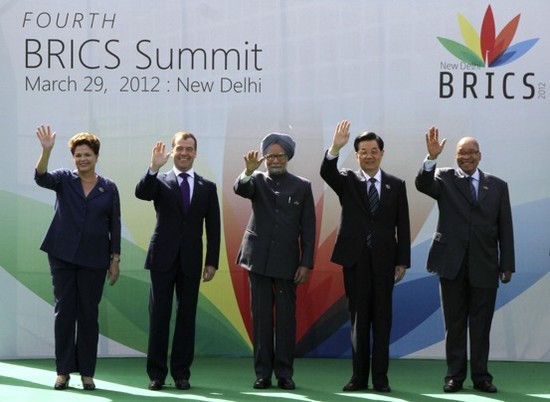In December last year, Brazil’s Foreign Ministry convened a group of academics to gather for a day and discuss the concept of the BRICS. Last week, a month after the 4th BRICS Summit in New Delhi, foreign policy makers and scholars (mostly economists and political scientists) met again, this time to analyze the BRICS summit declaration and debate what position Brazil should take vis-à-vis the grouping. The papers commissioned for the first meeting have recently been published as a book (in Portuguese). They form a remarkable collection of analyses and ideas about Brazil’s and the BRICS’ role in global order.
While Itamaraty has in the past been accused of being overly opaque and detached from Brazilian society, these meetings exemplify that the Foreign Ministry does make an effort to reach out and create platforms that allow policy makers and academia to engage. While some academics (such as Celso Lafer, foreign minister in 1992 and from 2001 to 2002) have played an important role in foreign policy making, an engagement with the broader academic community is an important step towards strengthening the public debate about Brazil’s role in the world. This matters because as Brazil will assume greater and more complex international responsibilities, the role of outside experts, public opinion and civil society in foreign policy making will greatly increase.
What was most striking about last week’s meeting was how much the discussion in Brazil about the concept of the BRICS has evolved over the past two years. During the track II meeting of the 2nd BRIC Summit in 2010 in Brasília, most participants were skeptical about the grouping. The domestic and international press paid virtually no attention, and those who did dismissed the idea. Last week, voices that had once questioned the existence of the BRICS had largely disappeared. One former ambassador argues that since there was now a consensus that the “BRICS concept makes sense”, it was time to think harder about how Brazil should use the grouping to its benefit.
One important reason for this consensus is the extremely low cost BRICS membership entails. Being part of the BRICS does not limit Brazil’s autonomy, nor are there any membership fees (as for the UN and many other international bodies). Brazil’s BRICS membership does not complicate its ties to any other partner such as the United States, Argentina or the European Union. Finally, BRICS summit visits are usually combined with bilateral meetings (in this years’ case, with India’s Manmohan Singh) which would have to take place anyways.
The potential benefits, on the other hand, are significant. BRICS membership has boosted Brazil’s international standing. It helps strengthen Brazil’s ties to international actors who are set to take a leading role in the 21st century – something of great economic and political importance to Brazil’s long-term national interest.
This, of course, still leaves the great question of what Brazil’s BRICS strategy should be: What does Brazil wants the BRICS Summit to focus on next year, in 2015 and in 2020? Should economic cooperation be at the core, should the BRICS seek to align their points of view on matters of international security, or both? This is where participants’ opinions diverged. Some argued that intra-BRICS trade and investment was the easiest area to make progress, while others argued that the group needed to find a common voice on big questions (such as climate change or the Middle East) in order to gain recognition.
Very little serious academic writing has been published so far on the BRICS, simply because it is such a recent phenomenon and many academics are reluctant to speculate and prefer to wait for tangible evidence before putting their thoughts on paper. Yet precisely because the details of the BRICS concept are not yet set in stone, and because of the significant potential the grouping holds for Brazil, academics in Brazil need to engage in an uncomfortable yet potentially beneficial exercise: to think out of the box and come up with genuinely new ideas. Many of the ideas presented in papers prepared for the meeting with Itamaraty are fanciful and will never be implemented, but some may shape policy making. Hopefully we’ll see many more of these brainstorming sessions on what Brazil wants the BRICS to be, what it wants to get out of it, and how it fits into Brazil’s broader foreign policy strategy.
Read also:
Despite economic slowdown, BRICS grouping is here to stay
Book review: “Brazil, the BRICS and the International Agenda”
BRICS Summit: A Perspective from Brazil
The “IBSAization” of the BRICS
See all articles on the BRICS here
Photo credit: Roberto Stuckert Filho/Agência Brasil









